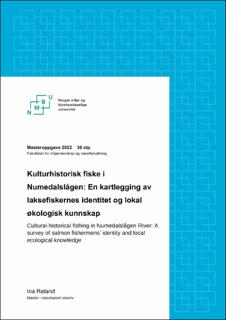| dc.contributor.advisor | Stian, Stensland | |
| dc.contributor.advisor | Øystein, Aas | |
| dc.contributor.author | Røland, Ina | |
| dc.coverage.spatial | Norway | en_US |
| dc.date.accessioned | 2022-11-25T08:23:58Z | |
| dc.date.available | 2022-11-25T08:23:58Z | |
| dc.date.issued | 2022 | |
| dc.identifier.uri | https://hdl.handle.net/11250/3034014 | |
| dc.description.abstract | Denne oppgaven er en kartlegging av identitet og lokal økologisk kunnskap hos laksefiskerne innen kulturhistorisk fiske i Numedalslågen. Dette for å få en forståelse av kulturhistorisk fiske som kultur og tradisjon og samtidig finne motivasjonen som ligger bak praktiseringen av fiskemetodene. Det tas i oppgaven utgangspunkt i to problemstillinger:
1. Hvordan kan identitet og lokal økologisk kunnskap bidra til en bedre forståelse av kulturhistorisk fiske som kultur og tradisjon?
2. Hva er det som motiverer dagens fiskere i Numedalslågen til å fortsette å praktisere kulturhistoriske fiskemetoder?
For å svare på problemstillingene ble det gjennomført semistrukturerte dybdeintervju av seks laksefiskere i Numedalslågen, to innen teinefiske og fire innen flåtefiske. Funnene fra intervjuene vil i oppgaven bli diskutert i lys av teori og andre relevante studier, før problemstillingene vil svares på.
Tilknytningen som informantene har til elva og kulturhistorisk fiske viser klart til deres identitet som laksefiskere i Numedalslågen. Deres praktisering av egne fiskerier bærer klare preg av lokal økologisk kunnskap, en kunnskap som har blitt overført fra generasjon til generasjon. Identitet og LEK kan bidra til en bedre forståelse av kulturhistorisk fiske som kultur og tradisjon med grunnlag i bakgrunnen til fiskemetoden. Identiteten viser til betydningen som ligger bak for laksefiskerne og LEK viser hvilken verdifull kunnskap laksefiskerne innehar og viktigheten av å bevare denne kunnskapen for kulturen og tradisjonen i Numedalslågen.
Motivasjonen ligger hovedsakelig i identiteten deres og LEK. Fiskeriet betyr mye for dem, de trives med å fiske laks, bevaringen av en tradisjon som har fulgt familien er viktig, felleskapet, også er det rekreasjon og avkobling som er sentralt for de fleste. Det er et miljø hvor de kan koble vekk fra virkeligheten.
Gjennom LEK og elveeiernes rolle i elva har de et potensial for å være med å påvirke forvaltningen mer enn de gjør i dag. | en_US |
| dc.description.abstract | This assignment is a mapping of the identity and local ecological knowledge of the salmon fishermen within cultural-historical fishing in Numedalslågen. This is to gain an understanding of cultural-historical fishing as culture and tradition and at the same time find the motivation behind the practice of the fishing methods. The thesis is based on two issues:
1. How can identity and local ecological knowledge contribute to a better understanding of cultural-historical fishing as a culture and tradition?
2. What motivates today's fishermen in Numedalslågen to continue to practice cultural-historical fishing methods?
To answer those two questions, semi-structured in-depth interviews were conducted with six salmon fishermen in Numedalslågen, two in teinefiske and four in flåtefiske. The findings from the interviews will be discussed in the thesis in the light of theory and other relevant studies, before the questions will be answered.
The informants' connection to the river and cultural-historical fishing clearly refers to their identity as salmon fishermen in Numedalslågen. Their practice of their own fisheries bears the clear mark of local ecological knowledge, a knowledge that has been passed down from generation to generation. Identity and LEK can contribute to a better understanding of cultural-historical fishing as culture and tradition based on the background of the fishing method. The identity refers to the importance behind the salmon fishermen and LEK shows the valuable knowledge the salmon fishermen possess and the importance of preserving this knowledge for the culture and tradition in Numedalslågen.
The motivation lies mainly in their identity and LEK. Fishing means a lot to them, they enjoy fishing for salmon, the preservation of a tradition that has followed the family is important, the community, also it is recreation and relaxation that is central to most of them. It is an environment where they can disconnect from reality.
Through LEK and the river owners' role in the river, they have the potential to be involved in influencing management more than they do today. | en_US |
| dc.language.iso | nob | en_US |
| dc.publisher | Norwegian University of Life Sciences, Ås | en_US |
| dc.rights | Attribution-NonCommercial-NoDerivatives 4.0 Internasjonal | * |
| dc.rights.uri | http://creativecommons.org/licenses/by-nc-nd/4.0/deed.no | * |
| dc.subject | Salmon fishing | en_US |
| dc.subject | Naturbasert reiseliv | en_US |
| dc.subject | Nature-based tourism | en_US |
| dc.subject | Laksefiske | en_US |
| dc.subject | Kartlegging | en_US |
| dc.subject | Mapping | en_US |
| dc.subject | Numedalslågen | en_US |
| dc.title | Kulturhistorisk fiske i Numedalslågen : en kartlegging av laksefiskernes identitet og lokal økologisk kunnskap | en_US |
| dc.title.alternative | Cultural-historical fishing in Numedalslågen River : a survey of salmon fishermens’ identity and local ecological knowledge | en_US |
| dc.type | Master thesis | en_US |
| dc.description.localcode | M-REIS | en_US |

